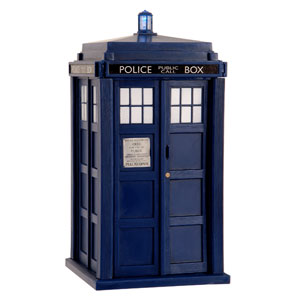Timey-Wimey
Time travel has literary rules just like vampires and werewolves and fairies do. Of course Dr. Who breaks them all on a regular basis, but we forgive him because the shows are so fun, with multiple doctors, love interests, and aliens that remind me vaguely of Sleestaks from Land of the Lost.
In Marking Time, the rules Saira and the other Descendants of Time have to follow are the ones I've gathered from some of my favorite authors. Simon Hawke wrote the 12-book Time Wars series that set the standard about the Grandfather paradox (if someone goes back in time and accidentally kills their grandfather before he meets their grandmother, how can he exist to go back in time to kill his grandfather?).
And, of course, timestream splits have been the subject of many long discussions over wine (I'm a little strange that way). The way Simon Hawke describes time in his first book, The Ivanhoe Gambit, is that it's like an actual stream or river. Throw a pebble into the stream (some random guy goes back and kills his grandfather) and the water might ripple, but it will close back around the spot where the pebble went in. But throw a boulder in (someone goes back in time and kills Adolph Hitler) and it might even divert the stream until it re-joins behind it. That's a timestream split. What happens to all those people who didn't die because Adolph Hitler did? On their timeline, they go on to have families and create whole generations of people who don't exist on the timeline we know. But then what happens at the moment the killer leaves his own time to go back and take out Hitler? Even Simon Hawke and his characters didn't know. They theorized that the two timelines (the one where Hitler lived, and the one where he died) have to rejoin, and when they do, it's a potential disaster of epic proportions.
Of course, there's my favorite of all time travel novels, Diana Gabaldon's Outlander (and the subsequent series). Claire accidentally time travels through standing stones to 18th century Scotland, meets the unbelievably dreamy Jamie Fraser, falls for him quite against her will, and goes on to have many lifetimes of happiness with him (with copious amounts of heartbreak, death, destruction and war for good measure).

Diana Gabaldon's time travel rules are less structured than Simon Hawke's, but she follows the basic premise that however much time passes in your "native" time, that much time has also passed in any other time in which you might find yourself. And events conspire to keep history in line, no matter how much Gabaldon's characters might want to change things. Sort of a timestream inertia, where splits are impossible because history has already happened.
I didn't want to spend chapters discussing the rules of time travel (let's be honest, I couldn't afford the extra word count), so Saira gets things a little simpler. People can't occupy the same time twice, so there's no chance of accidentally running into yourself and dissolving into a puddle of mental mush because you just met yourself coming around the corner (always a danger in a Simon Hawke book). And she can't significantly change history, because history has already happened the way it happened and events around her will conspire to keep it that way (thank you, Diana Gabaldon). Of course, keeping that rule doesn't affect Jack the Ripper's presence in my story at all, since history doesn't really know what happened to him.
But maybe Saira does...




